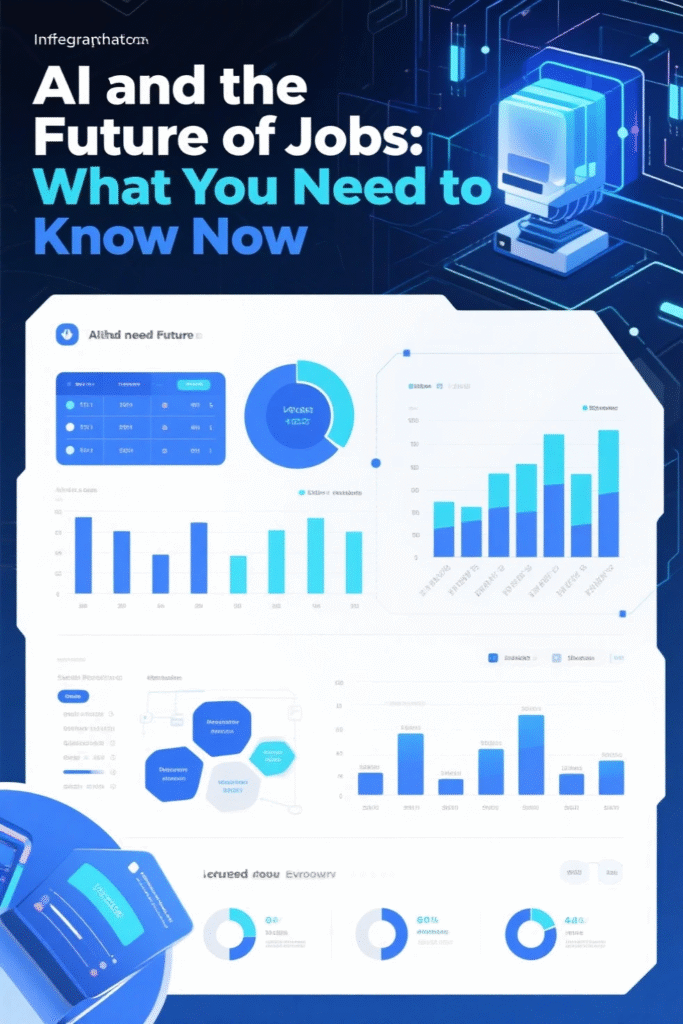
Introduction
Artificial Intelligence (AI) is no longer a futuristic concept—it’s here, and it’s reshaping the global workforce at an unprecedented pace. From automated customer service agents to self-driving vehicles and machine-learning algorithms replacing analysts, AI is transforming jobs, industries, and even entire economies.
But is this revolution a threat or an opportunity? Should we fear mass unemployment, or embrace AI as a tool for innovation?
This article explores:
- The impact of AI on jobs today and in the near future
- Which industries are most at risk or primed for growth
- How professionals can adapt and stay relevant
Let’s dive into what the data and experts are saying.
1. AI Is Already Changing the Workplace
AI systems are increasingly being used to perform tasks once done exclusively by humans. These include:
- Chatbots for customer service
- AI writers generating content and reports
- Predictive algorithms used in finance, logistics, and healthcare
- Robotics in manufacturing and warehousing
According to a 2023 McKinsey report, 30% of hours worked globally could be automated by 2030, with some sectors already seeing major changes.
2. Jobs Most at Risk from AI
Not all jobs are equally threatened. The most vulnerable roles tend to involve repetitive, rule-based tasks that AI can perform faster and more cheaply.
At-risk roles include:
- Data entry clerks
- Telemarketers
- Bank tellers
- Customer support agents
- Routine accounting jobs
The World Economic Forum estimates that 85 million jobs may be displaced by automation by 2025, but notes that 97 million new roles could emerge during the same period.
3. Jobs That Are Safe (and Growing)
Jobs that involve creativity, emotional intelligence, and complex human interactions are less likely to be automated. AI is powerful, but it still lacks true understanding, compassion, and ethical judgment.
Growing job sectors include:
- AI and machine learning specialists
- Cybersecurity experts
- Health and elder care professionals
- Software developers
- Renewable energy technicians
- Psychologists and social workers
Additionally, hybrid jobs that combine technical skills with soft skills—like product management or digital marketing—are on the rise.
4. How to Future-Proof Your Career
- 📘 Upskill Constantly: Learn new technologies, especially those that relate to your industry. Coding, data literacy, and AI tools like ChatGPT or Copilot are highly valuable.
- 🤝 Cultivate Human Skills: Communication, empathy, adaptability, and leadership are AI-proof skills that companies always need.
- 💼 Embrace Lifelong Learning: Use platforms like Coursera, edX, Udemy, and LinkedIn Learning.
- 🧠 Think Like a Problem-Solver: AI can analyze problems, but humans design the questions and interpret the results. Cultivating critical thinking is key.
5. The Role of Governments and Companies
To avoid large-scale job displacement and social unrest, governments and corporations must:
- Invest in AI training programs
- Offer reskilling support for displaced workers
- Develop ethical frameworks for AI deployment
- Ensure inclusive growth so no group is left behind
In 2024, the European Union announced a €2 billion initiative for AI job reskilling, targeting sectors hit hardest by automation. Read more about AI development and professional insights at Th3Professional.
6. AI Is a Tool, Not the Enemy
Fearing AI is not the solution. Using it wisely is.
Here’s how AI can empower workers:
- Automate boring tasks, freeing up time for creativity
- Enhance decision-making with real-time analytics
- Improve work-life balance through flexible tools
- Create new roles in entirely new industries
AI is not here to replace everyone—but it will replace those who resist adapting.
7. Real Stories: How Professionals Are Using AI Today
- Marketing professionals are using AI to generate ad copy, SEO strategies, and campaign analysis.
- Doctors and radiologists are leveraging AI to diagnose diseases more accurately and faster.
- Teachers are adopting AI platforms to personalize student learning.
“I used to spend hours analyzing customer feedback. Now, AI tools summarize and organize it in minutes—letting me focus on strategy,” says Maria L., Customer Experience Manager in London.
Final Thoughts
AI is not just a tech trend—it’s a new layer of reality shaping every industry. The best way to face this future is to be flexible, informed, and proactive.
Jobs will change—but human potential, when paired with smart tools, can soar to new heights.
Adapt or fall behind. The choice is yours.
By Bizbuzzup
